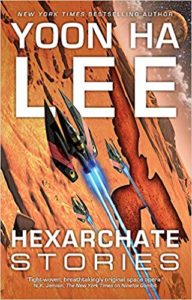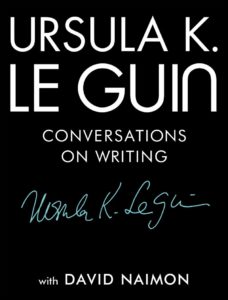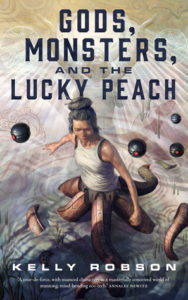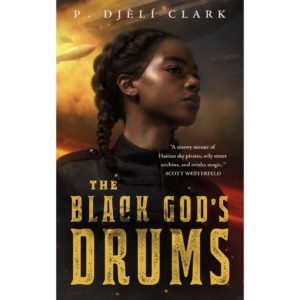My review of Revenant Gun, the third in Yoon Ha Lee’s Machineries of Empire series, ended “In short, I would greatly enjoy reading more stories set within Lee’s hexarchate, or indeed either the heptarchate that preceded it or the successor states that are trying to succeed it… And no more Jedao for a while, please. He has earned his rest.” Less than a year later, Lee has published Hexarchate Stories, a collection of 21 stories, of which eighteen were previously published — twelve on the author’s blog – and three that are new to this collection.
There is a lot more Shuos Jedao, but contrary to my previous expectation, I didn’t mind very much. Jedao began his career in Lee’s universe as a Shuos, the faction that is closest to an intelligence service and features a predilection for games of all sorts. He then served with the military faction, the Kel, for many years, ending as their most successful general ever but also one with a penchant for unacceptable extremes. He’s one of the two most prominent characters in all three of Lee’s previous novels. By the end of the third, though, my interest in him had waned. I didn’t mind seeing him again in Hexarchate Stories for two reasons: first, most of the stories cover times when Jedao was more human and less legend, and thus more interesting; second, many of them are short short stories, and it’s easy to be charmed by something that’s little more than a single anecdote.
Lee’s good at flash fiction, and he knows it, and it shows. He seems to feel freer to play around with many different aspects of stories, and the lightness of his touch in many of them — even when the subject matter is serious — makes the hexarchate fresh even after three novels that have delved into its very heart. The variety of the stories points out one of the strengths of his overarching setting: it’s vast, and if he will let himself, he can tell many different stories, many different kinds of stories in the hexarchate’s interstellar realm. If he wishes, he can also range up and down the timeline, going back to when the polity was a heptarchate, or forward to a time after the changes set in motion by Kel Cheris back in Ninefox Gambit. Though the flash fictions are short, they are by no means slight. When they’re about Jedao, they show previously unknown aspects of his tale, and they tend toward humanizing him. When they are not about Jedao, they illuminate something new about the hexarchate, or are there for the sheer joy of playing around with words and ideas. They don’t have to bear much weight; consequently, they lift up the reader.
In his author’s notes, Lee mentions that several of the short shorts that appeared on his blog were commissioned works. That’s an interesting point about the business of writing in the twenty-first century. One of an author’s revenue streams can be money that comes directly from fans. There need not be intermediaries between writers and their audiences. On the other hand, it also points toward the precariousness of writing for a living, where 6¢ to 9¢ per word is considered a professional rate. By contrast, when I was a commissioning editor more than ten years ago, New York PR writers tried to get $2 per word from me. Six to nine cents per word is a hobby, not a profession. I’m glad that Lee has found more ways to support his writing, and even more glad that the stories from his blog have been collected into a book that’s available for purchase in a brick and mortar bookstore.
Hexarchate Stories was a welcome set of glimpses into other tales within Lee’s star-spanning setting. It reminded me how much I like a well-crafted science fiction anthology, and it left me looking forward to still more stories from the hexarchate. (But I also mean it about less late-period Jedao. He breaks the setting, and I don’t find him all that interesting.)







